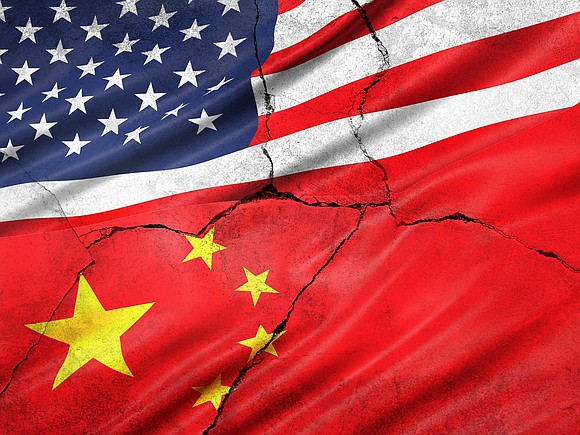China presents huge rewards for Wall Street -- with big risks
CNN/Stylemagazine.com Newswire | 4/12/2018, 10:30 a.m.
Matt Egan
(CNN Money) -- China has promised to lift restrictions on foreign lenders in its massive banking system, creating a huge opportunity for America's biggest banks.
The enormous size and rapid growth of China's economy make it a tantalizing market for Goldman Sachs, Citigroup and other Wall Street firms. They stand to make gobs of money by lending more to Chinese businesses and people and providing investment banking expertise to an underserved market.
Yet US banks must also traverse a murky regulatory structure and a tricky political system. And they'll need to steer clear of trouble in an economy that's already addicted to debt.
"There is a wild west atmosphere that can result in sudden decisions coming from the government," said Scott Morris, a former US Treasury Department official during the Obama administration.
"I don't think it's an easy path to navigate for any foreign firm," said Morris, a senior fellow at the Center for Global Development, a nonprofit think tank in Washington.
That's not to mention increasing trade tensions between Beijing and Washington, which have left the world's two biggest economies on the verge of a trade war.
Related: Chanos: China has a debt problem
Despite the trade spat, Chinese President Xi Jinping this week reiterated plans first announced last year to roll back roadblocks that had limited foreign access to his country's banking, securities, insurance and asset-management markets.
China's central bank on Wednesday unveiled a timeline to open China's financial market and pledged to allow domestic and foreign financial firms to compete on equal footing, state media reported.
By the end of June, the People's Bank of China plans to fully remove foreign investment limits on banks and asset management firms, according to analysts at Nomura, a Japanese banking giant.
The central bank will also allow foreign companies to own a majority stake (up to 51%) in securities, fund management, futures and life insurance firms, Nomura said. Those ownership limits are expected to be removed after three years.
Wall Street's trade group, the Securities Industry and Financial Markets Association, cautiously applauded the steps to gradually increase access to the world's No. 2 economy.
"While we are pleased about the progress, we are eager to see that the rules are implemented in a way that ensures a level playing field," Peter Matheson, SIFMA's managing director of international policy and advocacy, said in an interview.
SIFMA has been talking with officials in Beijing for months about those key details. The group has emphasized that opening China's massive banking market is mutually beneficial.
"Let's not think of this as some example of economic benevolence," Matheson said. "Allowing foreign financial firms to own their businesses in China is good for US firms and the US economy, and China's economy, too."
Related: China will link its stock market to London
Some of Wall Street's biggest players already have a footprint in China, albeit smaller than they'd like in an economy growing twice as fast as America's. China reported very strong growth of nearly 7% during each of the past two years.
"It's pretty much a no-brainer for any large international institution to want to be there," Morris said.
Goldman Sachs and Citigroup each generate about 4% of their revenue in China, according to FactSet. But those US banks get much more revenue from Canada, Brazil and other markets.
China is the largest foreign market for Bank of America and JPMorgan, though each bank gets less than 2% of its revenue there.
"It's a great opportunity for the big banks. They have the skills, money, capital and experience," said David Kotok, founder chief investment officer at Cumberland Associates.
Kotok played down concerns about the challenges of operating in China.
"The issues are the same as doing business anywhere in the world. China is not a Dark Ages country," he said.
Related: Chinese online payments giant could be worth $150 billion
Others are more skeptical about China's growth prospects, particularly given the economy's heavy reliance on borrowing.
For years, Beijing propped up its economy by encouraging vast amounts of lending that some fear has fed a bubble. Officials in China have responded to these concerns by encouraging companies to cut back on debt, but it's a slow process that could hurt growth.
China's corporate debt was equivalent to 161% of its total economic output at the end of last year, according to the Institute of International Finance. That's more than twice the debt burden in the United States and the highest among almost 30 economies that the group measures.
"It's an economic model built on debt. They have to continue to grow their debt to grow their economy," billionaire investor Jim Chanos told CNNMoney's "Markets Now" show on Wednesday.
"Every CEO since 1948" has pointed to China as a promising market, Chanos said. "But nobody ever makes any money there."
Beijing has sought to crack down on risky investment vehicles known as wealth management products. And regulators are pushing for more transparency of the loans companies have built up over the years.
"If there is a debt, you will see it. No one is trying to sweep it under the carpet," said Tjun Tang, a senior partner at Boston Consulting Group's Hong Kong office. "However, you do need to be cognizant about what risks you take on."




